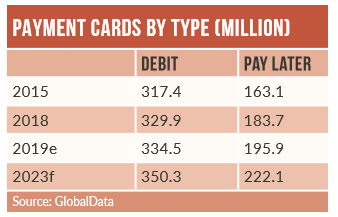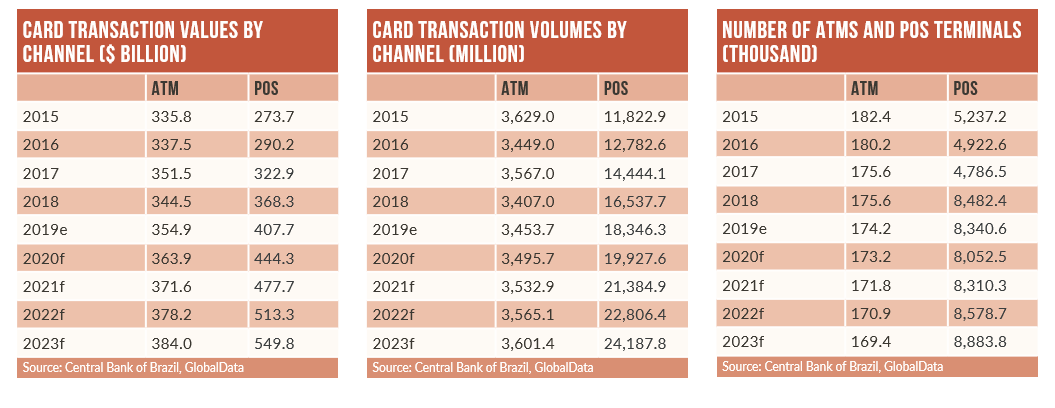Brazil remains a cash-driven economy, with cash accounting for 74.7% of the total payment transaction volume in 2019. However, with government initiatives, efforts by banks, and growing consumer awareness and confidence in digital payments, Brazilians are gradually shifting towards electronic payments.
The government has taken steps to boost financial inclusion and promote electronic payments in Brazil, including expanding the rural banking infrastructure, appointing banking correspondents, and introducing a regulation that allows consumers to open bank accounts through digital channels.
With the necessary infrastructure in place – including an extensive ATM network and the highest proportion of POS terminals among its regional peers – consumers are gradually becoming more aware of the benefits of payment cards. The frequency of card payments increased from 24.6 times per card per year in 2015 to 34.6 in 2019.
Over the period 2019–2023, e-commerce growth and the emergence of contactless technology will help to drive growth in the payment card market.
Debit card penetration is high in Brazil, and on average every Brazilian holds at least one debit card. This is supported by growth in the country’s banked population, with the government and banks striving to broaden access to financial services.
While debit card payments accounted for 31.4% of total debit card transaction value in 2019, the frequency of debit card payments stood at 30.2 in 2019 – higher than that of ATM cash withdrawals (10.2).
Use of debit cards for payments is supported by banks offering discounts and reward points. The recent cap on debit card interchange fees is also encouraging merchants to accept debit card payments.
Despite low penetration, credit and charge cards are the preferred card type for payments, accounting for 60.6% of total card payments by value in 2019.
Meanwhile, the credit and charge card payment frequency stood at 42.0 times per card per year in 2019 – higher than for debit cards. Banks are offering benefits in the form of reward programmes and cashback to encourage card use.
Growth is also supported by the availability of instalment facilities for bigticket purchases on credit cards. Reduced interest rates charged by leading banks will also aid growth in this space.
Brazil’s e-commerce market recorded a robust CAGR of 13.2% between 2015 and 2019, growing from BRL64.3bn ($16.6bn) to $27.2bn. The figure is forecast to reach $41.4bn by 2023, supported by rises in internet penetration, consumer preference for online shopping and discounts by e-retailers.
Banks in Brazil offer virtual cards to increase online security. Alternative methods such as Visa Checkout, Apple Pay and Google Pay are also popular.









